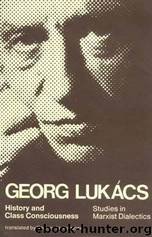blanks by Unknown

Author:Unknown
Format: epub
Published: 0101-01-01T00:00:00+00:00
1.
From this it follows that the powers that are beyond man’s control assume quite a different character. Hitherto it had been that of the blind power of a – fundamentally – irrational fate, the point where the possibility of human knowledge ceased and where absolute transcendence and the realm of faith began. [29] Now, however, it appears as the ineluctable consequence of known, knowable, rational systems of laws, as a necessity which cannot ultimately and wholly be grasped, as was indeed recognised by the critical philosophers, unlike their dogmatic predecessors. In its parts, however – within the radius in which men live – it can increasingly be penetrated, calculated and predicted. It is anything but a mere chance that at the very beginning of the development of modern philosophy the ideal of knowledge took the form of universal mathematics: it was an attempt to establish a rational system of relations which comprehends the totality of the formal possibilities, proportions and relations of a rationalised existence with the aid of which every phenomenon-independently of its real and material distinctiveness – could be subjected to an exact calculus. [30]
This is the modern ideal of knowledge at its most uncompromising and therefore at its most characteristic, and in it the contradiction alluded to above emerges clearly. For, on the one hand, the basis of this universal calculus can be nothing other than the certainty that only a reality cocooned by such concepts can truly be controlled by us. On the other hand, it appears that even if we may suppose this universal mathematics to be entirely and consistently realised, ‘control’ of reality can be nothing more than the objectively correct contemplation of what is yielded – necessarily and without our intervention – by the abstract combinations of these relations and proportions. In this sense contemplation does seem to come close to the universal philosophical ideal of knowledge (as in Greece and India). What is peculiar to modern philosophy only becomes fully revealed when we critically examine the assumption that this universal system of combinations can be put into practice.
For it is only with the discovery of the ‘intelligible contingency’ of these laws that there arises the possibility of a ‘free’ movement within the field of action of such overlapping or not fully comprehended laws. It is important to realise that if we take action in the sense indicated above to mean changing reality, an orientation towards the qualitatively essential and the material substratum of action, then the attitude under discussion will appear much more contemplative than, for instance, the ideal of knowledge held by Greek philosophers. [31] For this ‘action’ consists in predicting, in calculating as far as possible the probable effects of those laws and the subject of the ‘action’ takes up a position in which these effects can be exploited to the best advantage of his own purposes. It is therefore evident that, on the one hand, the more the whole of reality is rationalised and the more its manifestations can be integrated into the system of laws, the more such prediction becomes feasible.
Download
This site does not store any files on its server. We only index and link to content provided by other sites. Please contact the content providers to delete copyright contents if any and email us, we'll remove relevant links or contents immediately.
Kathy Andrews Collection by Kathy Andrews(11831)
The remains of the day by Kazuo Ishiguro(8999)
Spare by Prince Harry The Duke of Sussex(5196)
Paper Towns by Green John(5190)
The Body: A Guide for Occupants by Bill Bryson(5096)
Industrial Automation from Scratch: A hands-on guide to using sensors, actuators, PLCs, HMIs, and SCADA to automate industrial processes by Olushola Akande(5061)
Machine Learning at Scale with H2O by Gregory Keys | David Whiting(4313)
Be in a Treehouse by Pete Nelson(4051)
Never by Ken Follett(3955)
Harry Potter and the Goblet Of Fire by J.K. Rowling(3857)
Goodbye Paradise(3810)
The Remains of the Day by Kazuo Ishiguro(3412)
Into Thin Air by Jon Krakauer(3399)
Fairy Tale by Stephen King(3396)
The Cellar by Natasha Preston(3344)
The Genius of Japanese Carpentry by Azby Brown(3309)
120 Days of Sodom by Marquis de Sade(3274)
Reminders of Him: A Novel by Colleen Hoover(3116)
Drawing Shortcuts: Developing Quick Drawing Skills Using Today's Technology by Leggitt Jim(3080)
